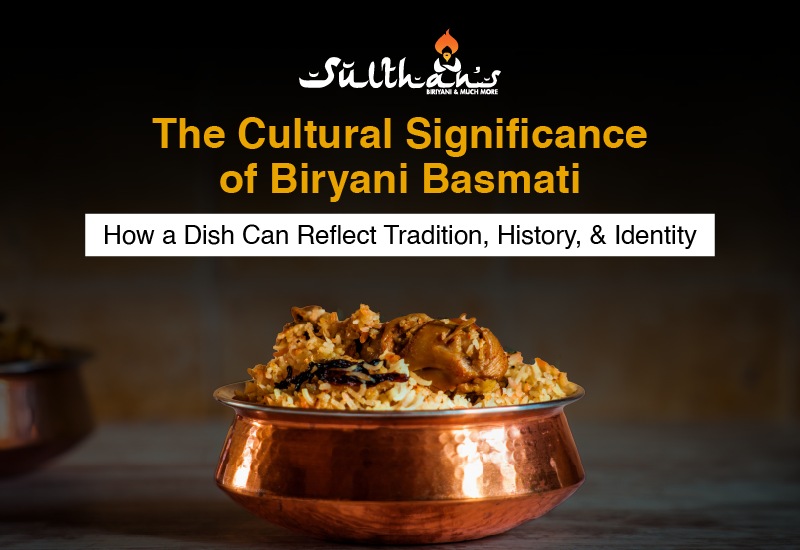Introduction
Biryani is more than just a savoury delight; it is a culinary symbol that is profoundly knit into different cultures. This aromatic dish, recognised for its flavours and numerous variations, transcends gastronomy. It’s a story about tradition, history, and identity, reflecting the complicated tapestry of the places from which it comes.
We delve into the historical roots of biryani in this blog, identifying its ancient origins and following its evolution over time. Join us on this savoury adventure that takes us beyond the kitchen and into the depths of history and cultural identity.
Historical Roots
This section delves into this iconic dish’s origins and transformative journey, revealing how it became a symbol of heritage and identity across various regions.
The Ancient Origins of Biryani

The story of biryani begins in the ancient landscapes where culinary art met with cultural confluence. Originating possibly from Persia or the Indian subcontinent, the dish’s ancestry is as layered as its ingredients. Ancient texts and culinary scripts hint at the rudimentary forms of biryani, where rice was cooked with aromatic spices and meats.
This section will explore these early beginnings, shedding light on how biryani was more than food—it was a part of royal feasts and a symbol of prosperity.
The Evolution of Biryani: A Historical Journey
As empires rose and fell, biryani travelled across lands and oceans, evolving with each cultural encounter. From the Mughal kitchens to the Southern coasts of India, from the spice-laden streets of the Middle East to the bustling localities of Southeast Asia, biryani absorbed elements of each region.
This historical journey of biryani is not just about culinary changes but also about how the dish became a cultural identity and communal harmony marker. We’ll explore the various regional variants of biryani, each telling its story of taste, tradition, and adaptation.
Regional Richness
Hyderabadi Biryani: A Taste of South India
Hyderabadi Biryani, a South Indian culinary jewel, is known for its harmonic fusion of Mughlai and Telugu culinary traditions. This variation is distinguished by its intense flavours and use of fragrant basmati rice, and it is prepared in a distinct ‘Dum’ manner. This slow-cooking procedure seals in the spices and aromas, resulting in a deep and layered taste experience.
Lucknowi Biryani: The Royal Awadhi Delight

Lucknowi Biryani, from the city of Nawabs, is the epitome of delicacy and refinement. This North Indian treat, unlike its southern counterpart, is noted for its delicate flavours and delicately spicy character. It has a mild taste that testifies to its royal Awadhi background, prepared in the ‘Pukki’ method, in which rice and meat are cooked separately and then layered.
Kolkata Biryani: A Fusion of Flavours
Kolkata Biryani stands out with its unique inclusion of potatoes and boiled eggs, a testament to the historical influences and adaptations in the region. Originating from the Nawab of Bengal kitchens, this variant is lighter on spices but rich in aroma, offering a distinct taste that beautifully marries the royal Mughlai flavours with the local Bengali palate.
Also Check – Nonveg Curries at Sulthans Biryani
Discover the Authentic Flavours at Sulthan’s Biryani
We offer an excellent assortment of biryani variants that would thrill any biryani connoisseur. Sulthan’s biryani is your ultimate culinary paradise, whether you crave the original Chicken, Mutton, and Prawn Biryani or want to experience regional delicacies like Hyderabadi, Lucknowi, and Kolkata-style Biryani.
Each dish at Sulthan’s Biryani is a testimony to India’s rich culinary tradition. The biryanis are meticulously prepared in the traditional woodfire Tamil wedding style, ensuring that every spoonful catches the essence of authentic and genuine flavours. This cooking technique not only improves the flavour but also adds a nostalgic touch of Chettinad culture to the biryani.
Culinary Traditions and Celebrations
- Biryani in Festive Feasts: A Tradition of Togetherness- It symbolises togetherness as families and communities gather to prepare and savour this elaborate dish during celebrations. Cooking biryani often involves multiple hands, reflecting the spirit of unity and bonding that festive occasions bring.
- The Role of Biryani in Cultural Celebrations – In various cultural celebrations and ceremonies, biryani holds a place of honour. Whether it’s weddings, religious festivals, or special events, the presence of biryani on the menu signifies the significance of the occasion. It satisfies the palate and adds a touch of grandeur and tradition to the festivities.
Symbolism and Identity

- Biryani as a Symbol of Regional Identity: Biryani is a powerful representation of regional identity. Different regions of India and neighbouring countries have evolved distinct biryani varieties, each exhibiting regional flavours and cooking techniques. People proudly express their cultural roots and heritage when they prepare or enjoy their regional biryani.
- The Unique Ingredients: The special ingredients of biryani are one of the keys to its cultural significance. Every component, from fragrant basmati rice to a broad assortment of spices, aromatic herbs, and premium meats, offers a story about its origin and cultural influence. These components contribute to the unique tapestry of flavours that distinguishes and delights each regional biryani.
Explore Sulthan’s Biryani Delights
Explore the tantalising world of Sulthan’s Biryani, where every bite is a journey through the rich tapestry of biryani flavours. Sulthan’s biryani delivers a culinary excursion that captivates the senses and celebrates the art of biryani, including classic favourites and regional delicacies.
Experience the enchantment of Sulthan’s Biryani—a location where biryani passion is presented on a platter, and every taste is a masterpiece that embraces the rich tapestry of biryani flavours.
Wrapping Up
In this flavorful exploration of biryani’s cultural significance, we’ve uncovered its historical roots, regional richness, and symbolism as a culinary icon. Biryani transcends mere food—a tradition, a symbol of identity, and a source of communal togetherness. As you savour the diverse biryanis, remember that each bite tells a story of tradition, heritage, and the love for exquisite flavours.
FAQs
1. What makes Sulthan’s Biryani special?
Sulthan’s biryani stands out for its diverse range of biryani varieties, authentic cooking methods, and commitment to preserving the rich cultural heritage of biryani.
2. Is biryani only limited to South India?
No, biryani is prepared in various styles across India, with each region infusing its unique flavours and techniques into this beloved dish.
3. How does biryani symbolise cultural identity?
Biryani symbolises cultural identity by showcasing the distinct regional flavours, ingredients, and cooking styles of different communities and regions.




